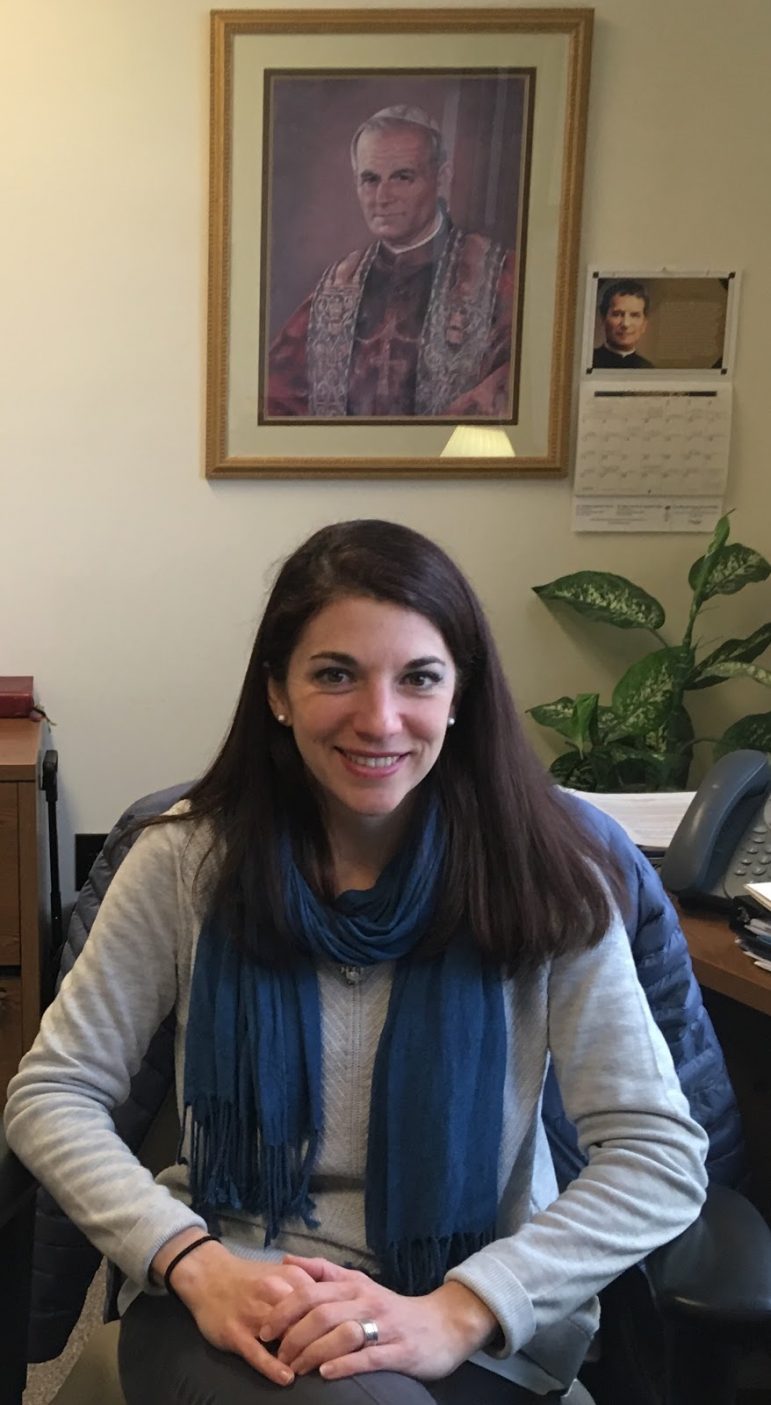
Debrah Miszak
Lansing Diocese director of consecrated vocations Dawn Hausmann with an image of Pope John Paul II. Considered a saint by the church, he established the “theology of the body,” which states that people have different roles to play in the world according to their biological sex.As American women grapple with their role in society during a Democratic primary which has featured a record number of female candidates, American Catholic women are struggling with their position in the church.
In February, the Vatican released a document summarizing the 2019 Amazon synod — a meeting of bishops and stakeholders in that region. The document did not provide a final answer on the synod’s hottest topics: the ordination of women to serve as deacons and the ordination of mature, married men to the priesthood.
The document, “Querida Amazonia,” addresses Pope Francis’ dream for the church in this region, where many people do not have regular access to priests or the Eucharist. In the document, Pope Francis calls for the church to embrace the culture and environment in the Amazon region and refrain from forcing a European model to solve priest shortages and sparse access to sacraments there.
Sister Mary Ellen Sheehan of the Servants of the Immaculate Heart of Mary is a retired theologian. She said the document has several strengths. In her view, the document addresses neither ordination question. Instead, she said, the pope probably avoided them because the universal church is not close to a consensus on these issues.
“Pope Francis is clear that this is a reflective document rather than an action document,” Sheehan said. “He isn’t telling people what to do or how to do it and is instead promoting enculturation to empower local bishops and priests to push for fuller lay involvement, and maybe there they can come to their own answers about ordination.”
Not all accept ‘Theology of the Body’
Dawn Hausmann, director of consecrated vocations in the Lansing Diocese, studied Pope John Paul II’s “Theology of the Body” at the Pontifical John Paul Institute for the Studies of Marriage and Family. She said men and women have complementary roles in the church that prevent women’s ordination. While men are meant to be the spiritual fathers, women are called to be wives and mothers, either physically or spiritually.
“I definitely am aware of the pope’s most recent statement of women not being given the role of the diaconate,” Hausmann said. “I’m sure some were very offended by that, but I think that’s because of a misunderstanding of what we really do as women in the church.”
Sheehan called complementarity a disguised form of subjugation.
“The picture that Francis presents of women is an issue,” Sheehan said. “In part, he reflects John Paul II’s complementarity view of women: that women complement men, who are called to be leaders, and men complement women, whose proper realm is the domestic sphere.”
Women’s ordination unlikely soon
Michigan State sophomore communications major Alondra Alvarez is a Catholic who identifies as a feminist.
“I feel like people might not respect [a woman priest] as much as she deserves,” Alvarez said. “Right now, people bend over backward for priests. But, I do think it would help women to see themselves represented that way.”
Even if some want to see women priests, Hausmann says it will not and cannot happen.
“We can’t negate what Jesus did,” Hausmann said. “He himself came as a man, and that wasn’t meaningless.”
Sheehan disagreed, saying women can exist in the image of Jesus just as much as men, and that the reasoning behind barring women from ordination is flawed.
“Francis says ordaining women, whether to the diaconate or the priesthood, would … put them into power structures, but he does not make the same point about men,” Sheehan said. “Faulty reasoning indeed … which may reflect the worst part of complementarity – that women are subordinate to men, that patriarchy is the intended pattern of organizing life.”
However, Hausmann said that Pope Francis values women’s input, and that women should not attempt to fill traditionally masculine roles.
“I sense there’s many times where certain job avenues or certain positions where sometimes women can fall into this trap of doing it in a manly way,” Hausmann said. “We need to fully, authentically live our feminine genius in the leadership roles that we do have.”
Those who want change in the church say it is unlikely
Because of the opposition to women’s ordination, Alvarez said she doesn’t think it’s a cause worth advocating for.
“I know for a fact if I were to tell my dad that we deserve women priests that he would go off,” Alvarez said. “It’s unnecessary to have this fight right now because women are looking to get representation in so many other areas, and the church would be really time consuming.”
Sheehan said it takes about a hundred years for the church to go through eras of thought. She doesn’t anticipate change to come quickly, but does believe it will happen. She said she wants to see the church’s hierarchy decentralized.
“Would I love to hear a liturgy said by a woman? Yes,” Sheehan said. “But, I don’t want to see a woman in fancy dress and with miters like a bishop. That’s just power.”
